|
|
|
Sort Order |
|
|
|
Items / Page
|
|
|
|
|
|
|
| Srl | Item |
| 1 |
ID:
148739
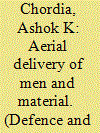

|
|
|
| 2 |
ID:
127524
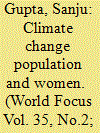

|
|
|
| 3 |
ID:
097453
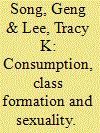

|
|
|
| 4 |
ID:
170271
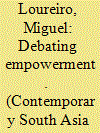

|
|
|
|
|
| Summary/Abstract |
In the aftermath of the 2005 earthquake that struck Pakistan-administered Kashmir an unprecedented number of development actors arrived in the region. Their impact influenced men’s perceptions of change in the gendered division of labour, as they claimed this arrival had increased women’s access to work in public spaces. Across urban and rural bazaars, a wide spectrum of male voices used this perceived increase to either try to further enhance women’s access or to curtail it. The struggle for women’s access to work in public spaces was visible in the stories these men told publicly. Although it pre-dated the earthquake, its aftermath made it more visible. Men’s narratives around women’s access to work post-earthquake also reflects a crisis of masculinity. The earthquake’s aftermath gave an opportunity for some men to reinforce the region’s classical patriarchy and others to challenge it; while doing so, men were also staking a claim at redefining what it meant to be a man.
|
|
|
|
|
|
|
|
|
|
|
|
|
|
|
|
| 5 |
ID:
096261
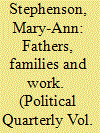

|
|
|
|
|
| Publication |
2010.
|
| Summary/Abstract |
This article is a review of Fathers, Families and Work, one of a series of reports published as part of the Equality and Human Rights Commission (EHRC)'s 'Working Better' programme. The article examines Fathers, Families and Work in the context of the wider conclusions and recommendations of the 'Working Better' programme and considers the extent to which these recommendations will translate into public policy. It concludes that there is a gap between parents' desire for both mothers and fathers to be involved in caring for children and the reality of long hours and inflexible workplaces that limits the time men can spend caring for children.
|
|
|
|
|
|
|
|
|
|
|
|
|
|
|
|
| 6 |
ID:
118926
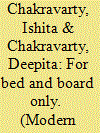

|
|
|
|
|
| Publication |
2013.
|
| Summary/Abstract |
This paper attempts to see how a particular labour market (domestic service), a traditionally male domain, became segregated both by gender and age in the post-partition Indian state of West Bengal, and mainly in its capital city Calcutta. It argues that the downward trend in industrial job opportunities in post independent West Bengal, accompanied by the large scale immigration of men, women and children from bordering East Pakistan (now Bangladesh), led to a general decline in wage rate for those in domestic service. Poor refugee women, in their frantic search for a means of survival, gradually drove out the males of the host population who were engaged in domestic service in urban West Bengal by offering to work for a very low wage and often for no wage at all. As poor males from the neighbouring states of Bihar, Orissa and the United Provinces constituted historically a substantial section of Calcutta domestic workers, it was mainly this group who were replaced by refugee women. The second stage in the changing profile of domestic service since the 1970s in urban West Bengal was arguably set by migrating girl children from different parts of the state to Calcutta city in search of employment. This is probably why West Bengal had the highest girl children's work-participation rate in urban India in 2001.
|
|
|
|
|
|
|
|
|
|
|
|
|
|
|
|
| 7 |
ID:
127155
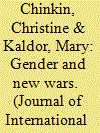

|
|
|
| 8 |
ID:
109130
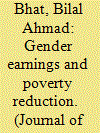

|
|
|
|
|
| Publication |
2011.
|
| Summary/Abstract |
Women get less of the material resources, social status, power and opportunities for self-actualization than men do who share their social location - be it a location based on class, race, occupation, ethnicity, religion, education, nationality, or any intersection of these factors. The process of feminization of poverty in Central Asia and Uzbekistan is intimately connected to the cultural and institutional limitations that put a ceiling on women's involvement in economic activity. This article attempts to study and explore gender in the context of poverty reduction in Uzbekistan, the most populated state of Central Asia, to understand the ways and manner in which poverty and other forms of deprivation demand women's participation in variety of contexts. The study is primarily an empirical one and is based on an extensive sociological investigation in the field.
|
|
|
|
|
|
|
|
|
|
|
|
|
|
|
|
| 9 |
ID:
131685
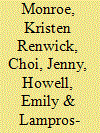

|
|
|
| 10 |
ID:
174505
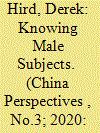

|
|
|
|
|
| Summary/Abstract |
This article probes the sources, manifestations, and significances of the ambivalences and contradictions in London-based Chinese middle-class male professionals’ sense of their own gendered and cultural identities in the context of China’s twenty-first century postsocialist modernity. In doing so, it shows how Chinese middle-class men’s sense of themselves connects with wider national debates about China’s orientation in the world. To make sense of the desire of some respondents “to become a Chinese gentleman,” the article introduces the notion of the postsocialist Confucian sublime, a vision of a cultural order of increasing appeal to well-educated, middle-class Chinese men. The article argues that the Confucian sublime offers globally mobile professional Chinese men the opportunity to transcend their ambivalence towards Western modernity by providing a sense of wholeness and attainment both at a personal level and in relating to China’s place in contemporary globality.
|
|
|
|
|
|
|
|
|
|
|
|
|
|
|
|
| 11 |
ID:
188189
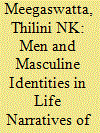

|
|
|
|
|
| Summary/Abstract |
Located at the intersections of men, masculinity, violence and narrative in the context of conflict-ridden South Asia, this study critically reads the configurations of men and masculinity in a selection of life narratives that revolve around Sri Lanka’s Eelam war (1983–2009). Based on the premise that hegemonic masculine identities shaped and interpellated by statist narratives in times of war are likely to have long-term detrimental impacts on societies, this paper considers life narratives that bring to life specific individual truths as alternative archives that could be sites of interruption, subversion and alternative imagination. This paper offers a critical feminist reading of the configurations of masculinities in Rohini Mohan’s The Seasons of Trouble (2014) and Ajith Boyagoda and Sunila Galappatti’s A Long Watch (2016), and explores the complex interactions among masculinity and violence that subvert dominant framings of men and masculinity and thereby help resist post-war patriarchal political revivals.
|
|
|
|
|
|
|
|
|
|
|
|
|
|
|
|
| 12 |
ID:
153243
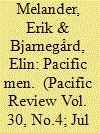

|
|
|
|
|
| Summary/Abstract |
The gender gap in attitudes to foreign policy is well established in public opinion literature. Studies have repeatedly reported that women tend to be more peaceful and less militaristic than men. This article reexamines attitudes of individuals in relation to foreign policy and pits the gender gap against the largely forgotten feminist gap. We argue that the individual-level relationship between gender equality attitudes on the one hand, and tolerance and benevolence on the other, is under-researched, but also that key contributions about the effects of feminism have been mostly ignored in research on the gender gap in public opinion. We return to the notion of a causal relationship between gender equality attitudes, and peaceful attitudes, and of a feminist gap that also exists among men. In a series of novel empirical tests, we demonstrate that attitudes to gender equality, not biological sex, explain attitudes towards other nationalities and religious groups. Using individual-level survey data from five countries around the Pacific: China, Indonesia, Japan, South Korea, and the United States of America, we show that both men and women who reject gender equality are much more hostile both to other nations and to minorities in their own country.
|
|
|
|
|
|
|
|
|
|
|
|
|
|
|
|
| 13 |
ID:
120850
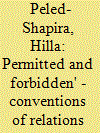

|
|
|
|
|
| Publication |
2013.
|
| Summary/Abstract |
This paper examines the difference in the way romantic connections between men and women are presented in the novels of the émigré Iraqi author Gha?ib u?ma Farman (1927-90) in comparison to the preceding generation of writers, as an expression of how ideology affected the artistic course taken by Communist authors, in view of the fact that relations between the sexes were a taboo subject in Arab literature. The paper shows the ways in which Farman copes with the taboo in the conservative patriarchal society in which he grew up and the rhetorical and thematic devices he uses to shatter accepted conventions. The works serve as a prism to examine the triple bond between political and social ideology, language and coping with issues of the relations between the sexes, by exploring selected issues relating to sexuality as expressed in these works: sexual relations outside marriage, forced marriage or prevention of marriage, and the treatment of the daughter-in-law by the husband's family.
|
|
|
|
|
|
|
|
|
|
|
|
|
|
|
|
|
|
|
|
|